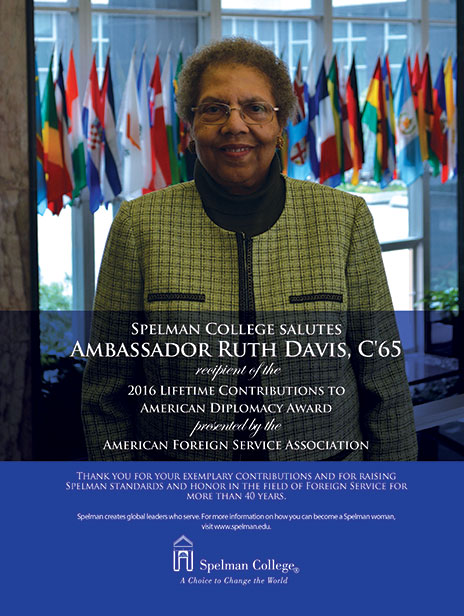A Selection of Articles on Constructive Dissent
COMPILED BY SHANNON MIZZI, EDITORIAL ASSISTANT
As a professional association and labor union, AFSA seeks to highlight achievement, outstanding performance and courage and sacrifice within the Foreign Service community. AFSA’s constructive dissent awards honor and spotlight those who work within the system to change policy and performance for the better.
AFSA has sponsored a constructive dissent awards program, unique within the U.S. government, for almost half a century. The awards serve as a reminder of the important role of dissent. Each year, AFSA calls for nominations for four dissent awards and presents them during a formal celebration in the Benjamin Franklin Diplomatic Reception Rooms at the State Department. For more information, please visit the AFSA website at www.afsa.org/constructive-dissent-awards.
The Foreign Service Journal continues to focus each year on the role of dissent in democracy and, in particular, in the Foreign Service. Here we call your attention to a selection of articles we have published on this topic.
“Deconstructing Dissent,” by Amelia Shaw,
The Foreign Service Journal, September 2015.
Amelia Shaw, the 2015 W. Averell Harriman Award recipient, argues that dissent is about integrity and speaking up about the things that matter, regardless of what you think about the possibility for change. Ms. Shaw received the award for her initiative and intellectual courage in fighting for equal legal rights and protections for unmarried women living along the U.S.-Mexico border, who face many obstacles in transmitting their American citizenship to children born in Mexico.
“Clearing the Air in New Delhi,” by Samuel Kotis,
The Foreign Service Journal, September 2015.
Samuel Kotis, recipient of the 2015 William R. Rivkin Award for Constructive Dissent, writes about using dissent as a tool to advance a sensible, health-conscious approach to combating air pollution in India. Despite initial resistance from superiors, Mr. Kotis committed himself to giving the Indian public access to data from air quality monitors installed in U.S. mission facilities in the country. This inspired new bilateral cooperation between the U.S. and Indian governments.
“What If I Disagree? Dissent in the Foreign Service,” by Ambassador Thomas Boyatt,
excerpted from the book Inside a U.S. Embassy, 2011.
Ambassador Thomas Boyatt writes about the history and significance of dissent in the Foreign Service. Foreign policy is constantly evolving, never settled; FSOs take an oath to “uphold and defend the Constitution,” swearing allegiance to their country rather than a certain administration. To fulfill that oath, they must be able and encouraged to “tell it like it is.”
“Advise and Dissent: The Diplomat As Protester,” by David T. Jones,
The Foreign Service Journal, April 2000.
Protests by Foreign Service officers may not have ended the Vietnam War, but they did lead to the creation of the Open Forum and the Dissent Channel. David T. Jones explains how the State Department was forced to learn that it had to listen to widespread policy dissent if it wanted to maintain a strong diplomatic corps (266, mostly junior, officers resigned from the Foreign Service in 1968 alone).
“AFSA Constructive Dissent Award Winners: Where Are They Now?” by Shawn Dorman,
The Foreign Service Journal, September 2013.
Eight Foreign Service members honored for dissent over the past 20 years discuss the impact of their decision to voice their opinion on their careers and on U.S. policy.
“Some Thoughts on Dissent,” by John H. Brown,
The Foreign Service Journal, July-August 2013.
John H. Brown argues that all government employees should be free to speak their minds as openly as possible, but the term “national security” is being wielded by many senior officials to prevent them from doing so. Brown resigned from the Foreign Service in 2003, after 22 years of service, in protest of the Iraq War.
“Integrity and Openness: Requirements for an Effective Foreign Service,” by Kenneth M. Quinn,
The Foreign Service Journal, September 2014.
Kenneth Quinn, three-time AFSA dissent award recipient, describes how his honesty and candor were often met with resistance and may have cost him some jobs during his 32-year Foreign Service career. But it ultimately allowed him to be proud of his role in our diplomatic corps. He considers constructive dissent not just an option but a responsibility, and encourages senior officials to treasure different viewpoints rather than silence them.
“The Role of Dissent: In National Security, Law and Conscience,” by Ann Wright,
The Foreign Service Journal, July-August 2013.
Ann Wright, who resigned from the Foreign Service in protest of the Iraq War, revisits her decision and reflects on its ethical implications. She wrestles with questions such as, “How should public servants go about challenging ill-considered policies?” and “Can one continue working for a government carrying out policies one believes constitute moral, ethical or legal failures?”





